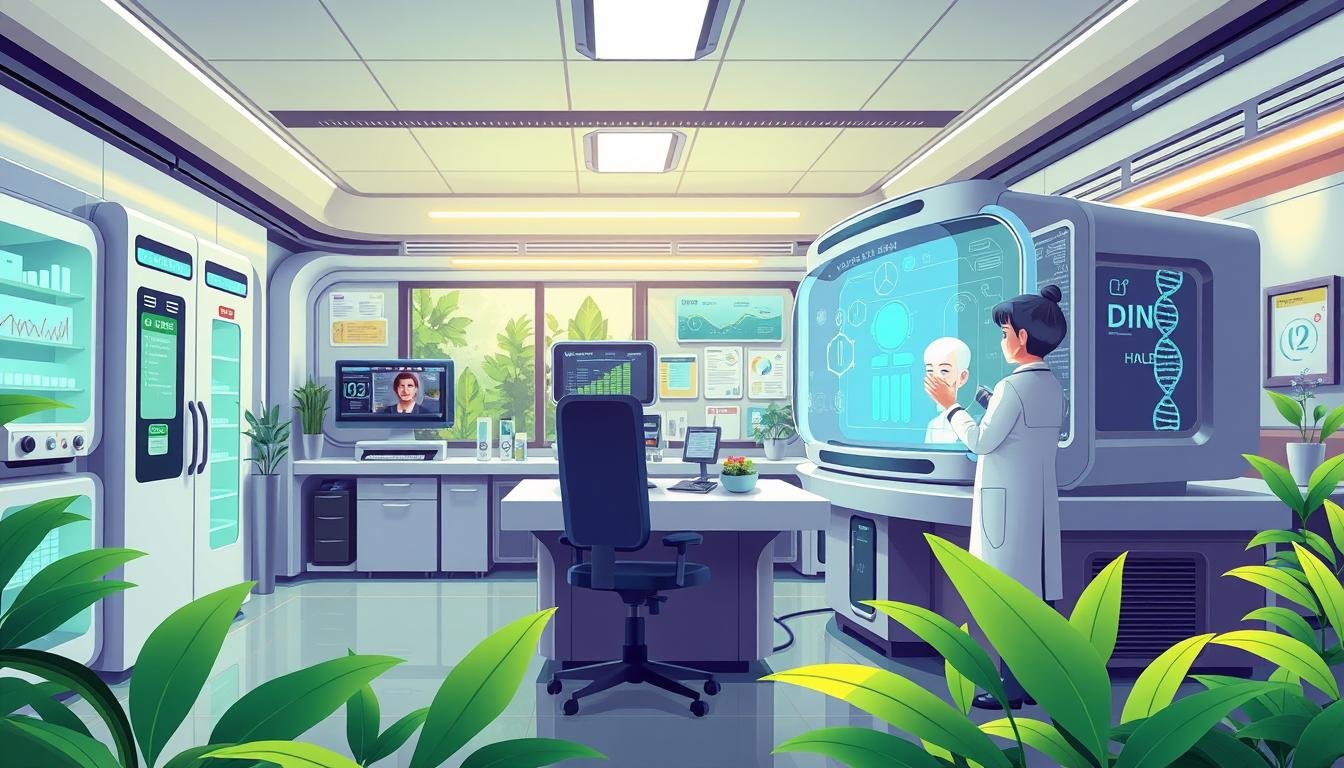Advances in Personalized Medicine Expected in 2025
Is the future of healthcare like something out of science fiction? As we near 2025, personalized medicine is set to change healthcare forever. It will use new tech, especially in predictive healthcare. But how will this change from treating symptoms to preventing them affect patients? And what part will AI and data play in this big change?
The main aim is clear: to make healthcare fit each person’s needs better. This means improving health and getting ready for future health issues. Personalized healthcare is not just about treating now; it’s about protecting us for the future, even with economic and demographic changes.
Key Takeaways
- Personalized medicines made up over a third of new drugs approved by the FDA after 2020.
- AI and biotech need big investments in training and partnerships to meet the skills gap by 2025.
- Pharma companies are moving from mass production to making treatments for each person, needing big changes inside.
- Future healthcare plans will focus on preventing problems, not just treating them, using new tech.
- Early disease detection and better patient results are key goals of using predictive healthcare models.
The Role of AI in Precision Medicine
AI is changing healthcare, especially in precision medicine, by 2025. It will make diagnoses more accurate and treatments more personalized. This change will help analyze big data to spot disease patterns, predict risks, and suggest the best treatments.
Most health factors come from behavior, social conditions, and other external factors, not just genes or medical history. AI helps make sense of this data to better patient care.
Enhancing Diagnostic Accuracy
AI will make medical diagnostics much better. For instance, doctors will use AI to spot diseases early in scans. This means they can act sooner and more accurately.
AI can also sift through vast amounts of personal and health data. This is like analyzing over 300 million books about each person’s life.
AI-Driven Treatment Plans
AI is also making treatment plans more personal. It uses genetic, biochemical, and physiological data to tailor treatments. This makes treatments more precise and effective.
AI also helps fight fraud and waste in healthcare, which costs up to 10% of global healthcare spending. Tools like IBM DataProbe have already saved millions in Medicaid fraud. This shows AI’s potential to save money and improve healthcare efficiency.
The mix of AI and precision medicine is speeding up personalized care. It’s combining AI with healthcare providers for better diagnostics and treatments.
Genomic Medicine: Tailoring Treatment to Genetic Profiles
Genomic medicine is changing healthcare by making treatments fit each person’s genes. This new field could greatly improve how we treat patients and make treatments better.
CRISPR and Genetic Editing
CRISPR is a key part of genomic medicine. It lets doctors make precise changes to genes. This could fix genetic problems at their root.
CRISPR also helps in making treatments that fit each person’s genes. As it gets better, it could lead to treatments that work much better for many people.
Predictive Genomic Testing
Predictive genomic testing is also important in modern medicine. It finds out if someone might get certain diseases before they show symptoms. This means doctors can start treating early and make treatments more personal.
Genetic tests can also help plan health strategies that are just right for each person. As these tests get cheaper and more available, they will help make treatments more personal and effective.
Pharmacogenomics and Drug Development
Pharmacogenomics is changing how we make drugs. It makes treatments fit each person’s genes, making drugs safer and more effective. This approach is key for personalized medicines, where drugs match a patient’s genetic profile.
For instance, the TPMT gene affects how drugs are broken down. Some people, especially in Asia, have a version of this gene that makes drugs more dangerous. Giving them a smaller dose helps keep them safe.
Personalized Drug Prescriptions
Personalized drugs are at the heart of pharmacogenomics. They use genetic testing to find the right dose and type of drug. A study in Europe found that genetic tests for TPMT were very accurate, helping doctors make better choices.
Genomics is getting even bigger, looking at proteins, genes, and how our bodies process drugs. This helps find new ways to keep drugs safe. The FDA is approving more personalized drugs, showing how important this field is.
Reducing Adverse Drug Reactions
Pharmacogenomics aims to cut down on bad drug reactions. These reactions can be very serious, even deadly. By focusing on genetic differences, pharmacogenomics helps make drugs safer.
Studying how drugs work in our bodies is also key. Genetic changes can affect how well a drug works. This helps doctors find the best treatment for each person.
There are guidelines for using genetic tests in medicine. These guidelines help make sure personalized treatments are safe and work well. They aim to improve health outcomes and reduce bad reactions.
Biomarkers and Early Disease Detection
Biomarkers are a big step forward in finding diseases early. They help doctors catch diseases before they get worse. This means patients can get help sooner, and it helps the healthcare system too.
Biomarkers are key in spotting diseases early. They also tell us how a disease might grow. This helps doctors plan the best treatment.
Molecular Diagnostics
Molecular diagnostics are at the heart of using biomarkers. They look at the molecular makeup of diseases. This lets doctors tailor treatments to fit each person’s genetic makeup.
- Analytical validation of biomarkers checks how well they work. It looks at things like accuracy and reliability.
- Molecular diagnostics use these biomarkers to guess how well treatments will work. This is especially true in cancer and heart disease.
Improved Patient Outcomes
Biomarkers make treatments more effective. They help doctors pick the right treatment for each patient. For example, in cancer, biomarkers can show which treatments will work best.
- Biomarkers help track how well treatments are working. They also show how diseases are changing.
- Studies show biomarkers are useful in many diseases. This includes Alzheimer’s, multiple sclerosis, and lung disease.
The more biomarkers are used, the better medicine gets. They help make treatments more personal. This leads to better health outcomes for people all over the world.
Advances in Personalized Medicine
Medicine is changing fast, making treatments more precise and effective for each person. This change comes from research in genetics, biotechnology, and analyzing patient data. It’s moving us toward a future where treatments are proactive and predictive.
Now, over a quarter of new drugs approved by the FDA are personalized. This is thanks to combining different sciences. For example, genetic studies help doctors find the right drug and dosage for each patient. This shows how important tailored treatments are for better health outcomes.
Next-generation sequencing (NGS) is key in precision medicine. It lets us quickly read large parts of a person’s genome. This helps doctors choose the best treatment for each patient, especially in cancer care.
The FDA is helping this progress with its precisionFDA portal. It lets researchers share data and try new ways to process NGS. The American Cancer Society also sees the benefits of personalized medicine in cancer care, like finding cancer early and choosing the right treatment.
The FDA is also working on new treatments like bacteriophage cocktails and gene therapies. They’re studying how genetics affect how our immune system reacts to treatments. The FDA’s Division of Translational and Precision Medicine is working to make treatments safer and more targeted.
But there are still hurdles to overcome, like getting personalized medicines approved. We need to show they work better than traditional treatments. Yet, the history of personalized medicine shows its value in treating diseases based on each person’s unique biology.
It’s important to understand these advances in personalized medicine. We also need to make sure clinical trials include more diverse patients. These efforts are leading to more effective treatments that focus on each person’s needs.
Patient-Centered Care Through Technology
By 2025, technology will make patient-centered care even better. Virtual healthcare assistants and remote monitoring will be key parts of health care every day.
Virtual Healthcare Assistants
Virtual healthcare assistants offer constant support and easy communication. They help patients and doctors work together better. These digital tools are crucial for managing chronic diseases, reminding patients about medication, and setting up appointments.
Studies show that using virtual assistants in health care has made a big difference. Doctors who used personalized care saw a 5% to 10% drop in costs. They also noticed better communication and monitoring, leading to shorter hospital stays and fewer readmissions.
Remote Patient Monitoring
Remote monitoring is changing health care by letting patients track their health at home. It helps doctors make quick changes to treatment plans. This can prevent hospital stays and improve health outcomes.
Technologies like wearables for tracking blood sugar and tools for brain monitoring are key. They save money by cutting down on expensive tests and trial-and-error treatments.
| Technology Type | Application | Benefits |
|---|---|---|
| Virtual Healthcare Assistants | Chronic illness management, scheduling | Reduced administrative costs, improved patient care |
| Remote Monitoring Wearables | Glucose monitoring, neuromonitoring | Real-time health data, lower hospital readmissions |
Investing in digital health solutions makes health care better for patients. It brings us closer to a future where care is focused on the patient and uses the latest technology.
Conclusion
Looking ahead to 2025, healthcare is on the verge of a big change. This change comes from new medical technologies and personalized medicine. These advancements will make treatments more precise, effective, and easy to use.
Pharmacogenomics is a key example of this progress. It lets doctors choose the right drugs for each patient based on their genes. This can lead to better treatments for diseases like breast cancer and blood disorders.
New methods like blood transcriptomics and metabolomics are also making a difference. They help doctors understand how the body reacts to treatments. This means they can create treatments that work better for each patient, especially for diseases like cancer and infections.
But, there are also challenges ahead. Making personalized medicines can be expensive and complex. There are also ethical issues to consider. It’s important to make sure treatments are clear and fair to patients.
Transparency is key to gaining patient trust. This trust is crucial for better health outcomes. With technologies like theranostics, we’re moving towards a healthcare system that’s more focused on the patient. This is a big step towards a future where healthcare is more proactive and effective.
Source Links
- 7 Healthcare Trends That Will Transform Medicine In 2025
- The Future of Personalized Medicine Hinges on Pharma Executives Revolutionizing Business Models
- Precision Medicine, AI, and the Future of Personalized Health Care
- ARTIFICIAL INTELLIGENCE AND PERSONALIZED MEDICINE
- Personalized Medicine: A Tailor Made Medicine
- Overview of the Development of Personalized Genomic Medicine and Surgery
- Precision Medicine
- Pharmacogenomics and Personalized Medicine | Learn Science at Scitable
- Pharmacogenomics: Driving Personalized Medicine – PMC
- Evaluating Novel Biomarkers for Personalized Medicine
- Early detection and personalized medicine: Future strategies against Alzheimer’s disease
- Advancing Research in Personalized Medicine
- Personalized Medicine: Motivation, Challenges and Progress
- Advances in Personalized Medicine
- The Role of Technology in Modernizing Personalized Patient Care
- Personalised Medicine—Implementation to the Healthcare System in Europe (Focus Group Discussions)
- Enabling technologies for personalized and precision medicine
- Recent Advances in Personalized Medicine








